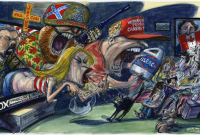Support strong Canadian climate journalism for 2025
Halifax cartoonist Michael de Adder never expected to become the latest weapon in the United States' bitter election battle — and certainly not the weapon wielded by disaffected Republicans.
But having been censored and fired by newspapers for his scathing parodies of U.S. President Donald Trump, he says he's ready for whatever comes his way.
“If you told me I was going to draw cartoons for former Republicans, I would have thought you were smoking some weed or something!” the freelance Canadian artist told Canada's National Observer editor-in-chief Linda Solomon Wood during an interview in her Conversations series Thursday.
“But they certainly don't pull their punches, and I don't pull my punches,” he said. “It's a weird but good fit.”
The Lincoln Project was founded by several high-profile veterans of the George W. Bush administration, perhaps most prominently the husband of longtime Trump adviser Kellyanne Conway. The registered political action committee has gained attention during this election campaign for its often brutal attack videos, which appeal to GOP voters to turn against the White House on Nov. 3. They even attempt to bait Trump directly with whispers of disloyalty within his own ranks.
The Lincoln Project, which sometimes uses conservative rhetoric to antagonize Trump's friends and turn his own allies against him, has not held back. Neither has de Adder, who now works as a freelancer after he left his career as a full-time political cartoonist at a newspaper.
His most popular image to date for the Lincoln Project is a Sept. 4 image of a casket borne by fellow soldiers, with Trump calling the deceased a “sucker.” It went viral with nearly 50,000 likes on Twitter. Also highly viewed was de Adder's Sept. 30 cartoon of COVID-19-infected Trump emitting a torrent of droplets, which was labelled by the Lincoln Project “Superspreader of hate.” It went viral with more than 43,000 likes on Twitter. Another of Trump walking past hundreds of body bags to fill the vacant Supreme Court seat on Sept. 26 exceeded 25,000 likes on the social media platform.
Another of his images depicts Trump ignoring an asteroid while reassuring dinosaurs, “Let's not cause a panic.” And yet another depicts the senior citizen knocked over and permanently injured by police during a Black Lives Matter protest.
“Every day, these days, we seem to be walking closer to the ledge,” de Adder said in the public video event Thursday. “There's something end-of-worldly going on south of our border.”
De Adder got his start in political cartooning at his university paper at Mount Allison University in the late 1980s, although he'd been drawing cartoons since he was a small child.
He initially aspired to become a serious painter, but when one of his early political cartoons captured the public imagination, he changed his mind.
It happened around the same time as his first solo gallery show of his paintings, which he describes as well-attended and successful. A cartoon in the student paper about U.S.-Canada free trade was so popular he found it posted on many dorm doors and bulletin boards across his campus.
“That was 'viral' in the '80s,” he quipped. “I realized everybody on campus saw that cartoon, but only about two per cent of them saw my paintings."
The prospect of drawing for “people down on the street” appealed to de Adder, so he switched gears.
It wasn't easy to find success as a political cartoonist, and de Adder says early years of failure helped hone his talents and determination.
Fast-forward 20 years from his first full-time cartooning job in 2000, and he's become Canada’s most-recognized cartoonist. This year, he won the 2020 Herblock Prize for editorial cartooning.
He still loves his work. “I never get tired of the fact that so many people see my work on a daily basis,” de Adder says.
But speaking his mind through pen and ink presents challenges for someone like de Adder, who doesn't shy away from controversy. His cartoon of Trump golfing past the iconic image of two migrants who drowned was so controversial he was swiftly fired from his Canadian newspaper.

He said he's been censored numerous other times as well, particularly while working for Eastern papers owned by the powerful Irving family; in one year, he had 54 cartoons barred from publication.
His artistic battle against Trump has earned him some enemies as well. He recounted some of the threats he's received, including death threats from Canadian Trump supporters, since the start of COVID-19.
It was serious enough that he called police, who revealed his newspaper had also received the threat. He’s not alone and noted many journalists received similar threats, particularly women.
He said he tries not to let threats bother him, but the 2015 massacre of cartoonists at France's Charlie Hebdo magazine rattled him and other cartoonists deeply.
“Charlie Hebdo changed everything — I stopped having my phone number and address listed,” he said.
The bigger threat to his field of work, however, is the same one facing print media in general. As newspapers make cuts to try to survive, editorial cartoonists have found themselves among the first to get the boot.
Attendance at an American cartoonist convention de Adder regularly attended plummeted from more than 350 several years ago to just 50, he said.
He blames social media for posting content for free and capturing advertising revenue that once went to media outlets. He called the massive potential reach on social media a “two-edged sword.”
That ability to go “viral” on social media is the phenomenon that has given de Adder an outsized role in the potentially historic U.S. election now unfolding.
Social media has destroyed the living of many of de Adder’s friends, he said. “But social media is also endless in how many people you can reach; it's ushered in a kind of second golden age of cartooning.”
De Adder no longer finds his printed cartoons taped to campus dormitory doors and pinboards. His images hit the Twitter and Facebook feeds of high-powered politicians and pundits every day, in every corner of the planet.
Coming next: Molly Jong-Fast, humourist and The Daily Beast's 'The New Abnormal' pundit, CNN’s Jim Sciutto, author of The Madman Theory, and Amy Goodman, one of America’s most beloved, proudly progressive journalists and Democracy Now! founder. Then back to Canada with new Green party Leader Annamie Paul.
We’ll cap this season off with Mother Jones’ CEO Monika Baurerlein and publisher Steve Katz. Check out past podcasts with luminaries Noam Chomsky, Sandy Hudson, Michael de Adder, Tzeporah Berman and Sandy Garossino here.
Also, you can join us on U.S. election night as Sandy Garossino and Linda Solomon Wood talk with Americans and Canadians about the results, the implications, the fears, the hopes and the dreams, as the votes are counted.






Comments
I wish the Lincoln Project would also take on some of the toadying enablers of Trump more often, like the malign Mitch McConnell, the not-much-better than spineless Romney, and the giant hypocrite Lindsay Graham. But especially McConnell. His opponent Amy McGrath has more integrity in her little finger than he has in his whole body. Trump wouldn't have got anywhere nor lasted so long to cause so much destruction and disorder if not for the lily-livered Republicans in the Senate, particularly. Disgusting lot. They're letting down the whole world, and I don't suppose any of them give even a moment's thought to how their dysfunctional deceitful government, that of a superpower nation, endangers every person on the planet, especially where it comes to willful complete ignorance on climate heating, but also on international stability, respect for women and minorities and migrants, and global health and economics. They're not just spiting Democrats, but the whole of the planet. A pox on the irresponsible lot of them. Mr DeAdder, have away, if you're able. Thank you for your creativity and clear vision.
This is very well said. I believe it is correct as can possibly be. And how sad is truth. As ordinary humans, what can anyone do about that mess? A natural human response is to help somehow. I guess we are left to the confines that: what goes around, does come around. G'bye donny.
Wonderful article and interview. Cartoons are right on point. Skewering Twitter twat is a job worth doing. Kudos and keep up the good work. Democracy is an important cause in the United states and the world.